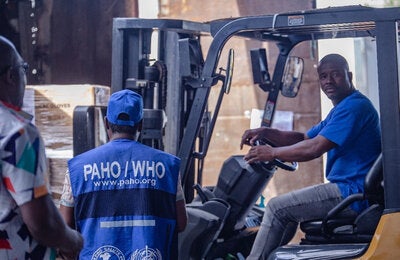Washington, D.C., June 20, 2008 (PAHO)—The Pan American Health Organization (PAHO) welcomes the initiative of ministers of health and education of Latin America and the Caribbean to discuss strategies to strengthen HIV prevention among young people.
The ministers will meet in Mexico City on August 1, before the inauguration of the XVII International AIDS Conference (AIDS 2008), at the invitation of the Government of Mexico. One possible outcome of this high-level meeting may be a declaration in which the ministers make recommendations to prevent the sexual transmission of HIV, sexually transmitted infections and unwanted pregnancies.
"This meeting shows the high level of commitment from the health and education sectors to provide a stronger response to HIV prevention, including the promotion of sexual health and provision of sex education," said PAHO Director Mirta Roses. In addition to PAHO, the ministerial meeting has the technical support of UNAIDS, UNESCO, UNFPA and UNICEF.
Research reveals that the inclusion of sex education in school curricula improves the skills, knowledge and behavioral intentions or adolescents and young adults. Comprehensive sex education addresses both abstinence and age-appropriate information about contraception. These programs have proven to reduce the number of sexual partners, and increase the use of condoms among sexually active adolescents.
There is no evidence that young people who receive comprehensive sex education engage in sexual activities earlier, according to PAHO specialists. On the contrary, evidence suggests that sex education leads to the adoption of self-protective behaviors, including delaying the onset of sexual activity.
In spite of the potential of sex education to prevent HIV transmission, the response of the education sector has often been inadequate. A 2004 United Nations survey found that most ministries of education have structures focused on HIV prevention. In practice, however, just over half (59%) of the 71 countries that replied to the Global Readiness Survey had dedicated budgets to implement activities.
Results from various studies also support the value of family in the lives of young people. Youths who feel connected to their family are less likely to smoke, drink alcohol, use drugs and engage in sexual activity at an early age. They also are involved less often in violence.
The ministerial meeting will also examine the need to strengthen the health system's response to young people, including their access to sexual health services.
The estimated number of new HIV infections in the Americas in 2007 was 160,000, bringing to 3.1 million the total number of people living with HIV in this region. Worldwide, half of all new HIV infections are estimated to occur among young people aged 15-24.
PAHO, founded in 1902, works with all the countries of the Americas to improve the health and quality of life of their peoples. It also serves as the Regional Office for the Americas of the World Health Organization (WHO).



